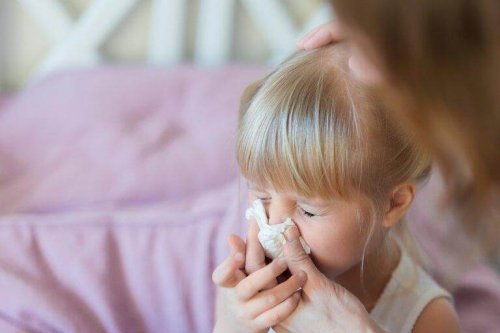Seven Tips to Treat Nighttime Cough in Children


Reviewed and approved by the doctor Maricela Jiménez López
Nighttime cough in children is very common. The child may not cough throughout the day but, as night falls, a persistent cough afflicts them, prevents them from falling sleep, and maybe even makes them vomit. This definitely puts parents on high alert.
Coughing is a physiological reflex and an involuntary body response. Through a violent exhalation, the body attempts to expel mucus, dirt, and other particles from the airways.
A healthy, school-age child with no history of respiratory infections can cough up to 34 times a day. However, coughing is one of the main reasons why parents take their children to the pediatrician, although it usually doesn’t require medical treatment.
Why Do We Cough?
The cough receptors are located along the airways, from the larynx to the bronchi. They’re stimulated by the presence of the following factors:
- Upper respiratory tract infections, including rhinitis, rhinopharyngitis, laryngitis, and the common cold.
- Bronchial hyperresponsiveness.
- Asthma and allergies.
- Gastroesophageal reflux disease (GERD).
During the day, many children cough occasionally, but can’t stop coughing once they go to bed. This is because, during the day, the child is standing and moving, which means that their mucus is also moving. However, when they lie down, their airways become more congested because the mucus isn’t moving as much.
Congestion and posture dry up the mucus and airways, which is why they can’t stop coughing.
Take a look at this article: How to Prepare Ginger as a Cough Remedy
How to Treat Nighttime Cough in Children
Nighttime cough in children can be very distressing when it last for a long time, as it can indicate a more serious condition. It negatively impacts sleep and daily activities and affects the quality of life of children and their parents.
It can be generally treated at home with these recommendations:
Avoid an Overly Dry Environment
It’s necessary to provide moisture to the child’s room. Humidifiers are very useful, but they should be thoroughly cleaned. If you use heating, you must make sure that it isn’t too high and also place a water container above the radiator to provide moisture to the air.
Help Thin the Mucus

To thin the mucus so it can be expelled more easily, it’s important to keep your child hydrated. This is as simple as making sure they drink a lot of water. You can also give them coconut water or fruit juice combinations.
Try to Help Them Sleep in a Semi-sitting Position
As the horizontal sleeping position worsens nighttime cough in children, you can try to make them sleep slightly sitting up. Lift the head of the bed a little or put some pillows under them and in their back.
Improve Nasal Breathing
If they have thick mucus, try saline solutions that can be found in sprays or drops. They’re uncomfortable for children, but very effective.
Also, you can massage the child’s chest (as long as they’re older than two) with a mixture of essential oils:
Ingredients
- 2 drops of essential eucalyptus oil
- 10 drops of incense essential oil
- ½ cup of sweet almond oil (100 ml)
What to do
- Mix all the oils well in a container.
- Put a small amount on your hands and massage your child’s chest to relieve their congestion.
Before you go, don’t miss: 5 Teas for a Cough
Relieve Throat Dryness
It has been proven that honey relieves dry cough. You can give your child a teaspoon of honey before bed or when they start coughing. You can also dilute it in warm milk.
Another home remedy for nighttime cough is to chop a white or red onion and pour some honey on top of it. The honey will dilute after a few minutes. You can give your child this “syrup” every day.
Onion: An Old Remedy
A very effective way to relieve nighttime cough in children is to put a chopped onion beside their bed. This old remedy is effective because onion is rich in polyphenols, natural antihistamines that relieve allergy symptoms and reduce airway inflammation.
If you add some sugar to the onion, its aroma will fill the entire room and your child will stop coughing.
Avoid Self-medicating
Generally, nighttime cough in children doesn’t require medications of any kind. If in doubt, consult your pediatrician.
Over-the-counter drugs sold in pharmacies are contraindicated for children under the age of two. These contain codeine, dextromethorphan, or cloperastine, which can have harmful side effects.
Conclusion
It’s very common for children to start coughing due to respiratory infections once they start daycare or preschool. According to doctors, a cough is considered chronic if it persists for more than four weeks.
If your child also has trouble breathing and sleeping, you should consult your pediatrician. It’s also important to remove environmental irritants such as cigarette smoke and cleaning chemicals from the home.
All cited sources were thoroughly reviewed by our team to ensure their quality, reliability, currency, and validity. The bibliography of this article was considered reliable and of academic or scientific accuracy.
- Alsubaie, H., Al-Shamrani, A., Alharbi, A. S. & Alhaider, S. (2015). Clinical practice guidelines: Approach to cough in children: The official statement endorsed by the Saudi Pediatric Pulmonology Association (SPPA). International Journal of Pediatrics and Adolescent Medicine, 2(1), 38-43. Disponible en: https://www.ncbi.nlm.nih.gov/pmc/articles/PMC6372369/
- American Academic of Pediatrics [AAP]. (s.f.). La tos y el resfriado en niños: ¿medicamentos o remedios caseros? HealthlyChildren.org. Disponible en: https://www.healthychildren.org/Spanish/health-issues/conditions/chest-lungs/Paginas/Coughs-and-Colds-Medicines-or-Home-Remedies.aspx
- Beigoli, S., Behrouz, S., Memarzia, A., et al. (2021). Effects of Allium cepa and its constituents on respiratory and allergic disorders: A comprehensive review of experimental and clinical evidence. Evidence-based Complementary and Alternative Medicine: eCAM, 2021, 1-22. Disponible en: https://www.ncbi.nlm.nih.gov/pmc/articles/PMC8452398/
- Begic, E., Begic, Z., Dobraca, A. & Hasanbegovic, E. (2017). Productive cough in children and adolescents–view from primary health care system. Medical Archives, 71(1), 66-68. Disponible en: https://www.ncbi.nlm.nih.gov/pmc/articles/PMC5364784/
- Chapman, K. R. (2021). Just as the Twig Is Bent, the Tree’s Inclined. Annals of the American Thoracic Society, 18(9), 1461-1463. Disponible en: https://www.ncbi.nlm.nih.gov/pmc/articles/PMC8489861/
- Chang, A. B. (2005). Cough: are children really different to adults?. Cough, 1(7), 1-15. Disponible en: https://www.ncbi.nlm.nih.gov/pmc/articles/PMC1277009/
- Dorsch, W. & Ring, J. (2020). Anti-inflammatory substances from onions could be an option for treatment of COVID-19—a hypothesis. Allergo journal international, 29(8), 284-285. Disponible en: https://www.ncbi.nlm.nih.gov/pmc/articles/PMC7573243/
- Lamas, A., de Valbuena, M. & Máiz, L. (2014). Cough in children. Archivos de Bronconeumología, 50(7), 294-300. Disponible en: https://pubmed.ncbi.nlm.nih.gov/24507905/
- Marchisio, P., Picca, M., Torretta, S., et al. (2014). Nasal saline irrigation in preschool children: a survey of attitudes and prescribing habits of primary care pediatricians working in northern Italy. Italian journal of pediatrics, 40(1), 1-8. Disponible en: https://www.ncbi.nlm.nih.gov/pmc/articles/PMC4041066/
- Oduwole, O., Udoh, E., Oyo, A., et al. (2018). Honey for acute cough in children. Cochrane Database of Systematic Reviews, 2018(4), 1-80. Disponible en: https://www.ncbi.nlm.nih.gov/pmc/articles/PMC6513626/
- Pasdaran, A. & Sheikhi, D. (2016). Volatile oils: Potential agents for the treatment of respiratory infections. The Microbiology of Respiratory System Infections,2016, 237-261. Disponible en: https://www.ncbi.nlm.nih.gov/pmc/articles/PMC7149900/
- Paul, I. M., Beiler, J. S., King, T. S., et al. (2010). Vapor rub, petrolatum, and no treatment for children with nocturnal cough and cold symptoms. Pediatrics, 126(6), 1092-1099. Disponible en: https://pubmed.ncbi.nlm.nih.gov/21059712/
-
Singh, D. P., Jamil, R. T. & Mahajan, K. (2018). Nocturnal cough. StatPearls. Disponible en: https://www.ncbi.nlm.nih.gov/books/NBK532273/Zanasi, A. & Dal Negro, R. W. (2022). Coughing Can Be Modulated by the Hydration Status in Adolescents with Asthma. Children, 9(4), 1-7. Disponible en: https://www.ncbi.nlm.nih.gov/pmc/articles/PMC9030844/
This text is provided for informational purposes only and does not replace consultation with a professional. If in doubt, consult your specialist.








